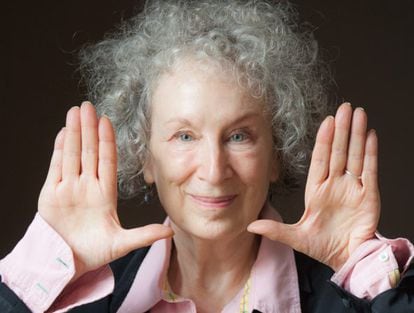The poets hang on
It’s hard to get rid of them,
though lord knows it’s been tried.
We pass them on the road
standing there with their begging bowls,
an ancient custom.
Nothing in those now
but dried flies and bad pennies.
They stare straight ahead.
Are they dead, or what?
Yet they have the irritating look
of those who know more than we do.
More of what?
What is it they claim to know?
Spit it out, we hiss at them.
Say it plain!
If yon try for a simple answer,
that’s when they pretend to be crazy,
or else drunk, or else poor.
They put those costumes on
some time ago,
those black sweaters, those tatters;
now they can’t get them off.
And they’re having trouble with their teeth.
That’s one of their burdens.
They could use some dental work.
They’re having trouble with their wings, as well.
We’re not getting much from them
in the flight department these days.
No more soaring, no radiance,
no skylarking.
What the hell are they paid for?
(Suppose they are paid.)
They can’t get off the ground,
them and their muddy feathers.
If they fly, it’s downwards,
into the damp grey earth.–
Go away, we say —
and take your boring sadness.
You’re not wanted here.
You’ve forgotten how to tell us
how sublime we are.
How love is the answer:
we always liked that one.
You’ve forgotten how to kiss up.
You’re not wise any more.
You’ve lost your splendour.
But the poets hang on.
They’re nothing if not tenacious.
They can’t sing, they can’t fly.
They only hop and croak
and bash themselves against the air
as if in cages,
and tell the odd tired joke.
When asked about it, they say
they speak what they must.
Cripes, they’re pretentious.
They know something, though.
They do know something.
Something they’re whispering,
something we can’t quite hear.
Is it about sex?
Is it about dust?
Is it about fear?
 |
| Margaret Atwood |
Los poetas resisten
Es difícil librarse de ellos,
aunque Dios sabe que se ha intentado.
Los encontramos en el camino
en actitud mendicante, con sus platos,
una costumbre ancestral.
No tienen nada,
excepto moscas secas y céntimos falsos.
Nos miran como pasmados.
¿Están muertos o qué?
Sin embargo, tienen esa mirada irritante
de los que saben más que nosotros.
¿Saben más de qué?
¿Qué es lo que alegan saber?
Escupidlo, les silbamos.
¡Decidlo claro de una vez!
Si buscas una respuesta sencilla,
entonces fingen estar locos,
o borrachos, o pobres.
Se pusieron esos disfraces
hace algún tiempo,
esos jerseis negros, esos andrajos;
ahora pueden quitárselos.
Y tienen problemas con sus dientes.
Ésa es una de sus cargas.
Les vendría bien ir al dentista.
También tienen problemas con sus alas.
No se muestran dispuestos a colaborar
con nuestro departamento de vuelos.
Ya no planean, no resplandecen,
no bromean.
¿Para qué demonios les pagamos?
(Imagina que les pagamos.)
No pueden despegar
con sus plumas enlodadas.
Si vuelan, es hacia abajo,
hacia la húmeda tierra gris.
Idos, les decimos,
y llevaos vuestra aburrida tristeza.
No os queremos aquí.
Se os ha olvidado cómo decirnos
lo sublimes qué somos.
Que el amor es la respuesta,
siempre nos gustó este verso.
Se os ha olvidado cómo seducirnos.
Ya no sois sabios.
Habéis perdido vuestro esplendor.
Pero los poetas resisten.
No se puede decir que no son tenaces.
No saben cantar, no saben volar.
Sólo saltan y croan
y se golpean contra el aire
como si estuvieran en jaulas,
y cuentan el viejo chiste.
Cuando les preguntan, responden
que dicen lo que deben.
¡qué pretenciosos son!
Sin embargo, saben algo.
Hay algo que sí saben.
Algo que están susurrando.
No alcanzamos a oírlo.
¿Será sobre el sexo?
¿O sobre el polvo?
¿O sobre nuestro miedo?
No hay comentarios:
Publicar un comentario